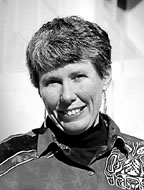
 April
23, 2003:
President's
Page
April
23, 2003:
President's
Page
Leadership
in Engineering and Applied Science
Photo: Maria Klawe, dean, School of Engineering and Applied Science
In January, Maria Klawe
became dean of our School of Engineering and Applied Science. A leader
in academia and industry, Dean Klawe came to Princeton from the University
of British Columbia, where she served as Dean of Science and a faculty
member in the Department of Computer Science. She began her career at
the IBM Almaden Research Center in California.
I feel tremendously fortunate
to lead Princeton University’s distinguished and unique school of
engineering and applied science at this time. Every facet of human society
is being affected by new technologies and the breadth, depth and rate
of this impact are increasing. Education and research in engineering and
applied science are more important than ever before, especially in a university
like Princeton that plays such a key role in educating the future leaders
of the world. To maintain its leadership role, Princeton must be one of
world’s top engineering schools, and it must achieve this goal in
a way that exemplifies Princeton’s values and character. There is
no doubt that we will succeed if we apply the right mix of determination,
vision and hard work—and, of course, that special Princeton magic.
The Princeton magic is perhaps
the most important ingredient. Princeton enthusiasts are everywhere, and
they are eager to help move Princeton to the top. The University administration,
faculty, alumni, industry, government, even the other top engineering
schools—everyone seems to be rooting for us; everyone believes this
goal is attainable; everyone offers support.
There is no doubt that we have
much work ahead of us to attain this goal. Our first step is the initiation
of an intensive strategic planning process. The output will be a combination
of road-map and business plan that will frame our develop-ment for the
next five to ten years. Together with influential external participants,
the members of the school’s six departments will jointly identify
the areas in which we can and should lead the world, and the strategies
for how we will get there.
Beginning this summer we will
hold a series of retreats, each focused on a single major topic such as
undergraduate education, graduate education, interaction with industry,
and key technologies such as information technology, nanotechnology and
bioengineering.
Questions about undergraduate
education that may seem worth pursuing include whether we can develop
an interdisciplinary option for first-year students that allows them to
learn all their first-year math and physics in the context of an area
of engineering applications such as environmental, bio-, or materials
engineering. Can we develop an internship program in which students can
spend six to twelve months working in their area in industry or public
service after their junior year? What is the best approach to providing
liberal arts students with a basic understanding of the key technologies
and their potential for positive and negative influence on society? Should
we develop engineering courses that bring together students from all years
and all parts of the university to work in teams on engineering projects
that solve societal problems? Should we do this with an international
flavor in collaboration with programs such as Princeton in Africa?
Another area that we think
needs attention is graduate education. We have world class faculty in
both research and teaching, and they attract stellar graduate students.
We want our engineering graduate students to have a Princeton experience
that matches that of our undergraduates not only in the quality of learning
but also in the quality of life. Graduate students are key contri-butors
to engineering research, and can serve as wonderful mentors and role models
for undergraduates. We will be working to promote more interaction between
our graduate and undergraduate students, and to build stronger links among
the students in different departments and across different ethnic cultures.
We also want to excel by creating
a School that fosters outstanding teaching and learning experiences for
everyone, including women and under-represented minorities. We are already
ahead of most engineering institutions in terms of our representation
of women and African Americans as undergraduates and faculty members,
but we still have a long way to go to meet our aspirations of attracting
women and minority engineers and creating a diverse and welcoming community.
Because technology permeates
society and is increasingly taking center stage in determining how society
will evolve, we must find ways to work closely with the other disciplines
at Princeton. The scientists and engineers who create new technologies
are often not involved in the significant policy decisions that result
from their work. Moreover, they often do not consider important policy
implications while the work is in progress. Our responsibility as educators
is to ensure that our future engineers and scientists understand technology
in its full societal context and to ensure that future policy makers are
at least literate in the basic principles of science and engineering that
drive these technologies.
Finally, we need to learn how
to work effectively and efficiently with partners, including industry
and other institutions. Many of the most important research and education
initiatives are too big to be undertaken at a single university. We must
learn how to benefit from institutions with different cultures and traditions,
while preserving the many wonderful strengths of Princeton.
We’ll know we have reached
our goals when Princeton springs to mind whenever other institutions are
asked to identify leaders in the engineering field, whenever government
and industry look for the best research partners, whenever prospective
students seek the best engineering education. Given the enormous good
will and support of Princeton alumni, we’ll be getting there soon!
![]()
